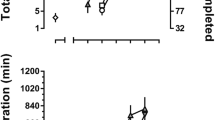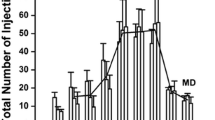Abstract
Six monkeys were trained to self-administer orally delivered phencyclidine (0.25 mg/ml) under a fixed-ratio 16 (FR-16) schedule. Water was concurrently available under an FR-16 schedule. During initial phencyclidine training, three monkeys were allowed free access to food (food satiation) and three were maintained at 85% of their free-feeding body weights (food deprivation). At the end of the training phase, the food-satiated monkeys were food-deprived. After behavior was stable for ten sessions, all monkeys were food-satiated and tested with a range of phencyclidine concentrations (0.0625–1 mg/ml). They were subsequently food-deprived and tested with concentrations of 0.0312–1 mg/ml, and then they were again food-satiated and tested with 0.0312 and 0.25 mg/ml. The monkeys that were trained to self-administer phencyclidine-maintained responding at lower drug concentrations when later tested while food-satiated. In contrast, monkeys that were trained while food-deprived did not respond for phencyclidine in excess of water at the lower concentrations when later tested while food-satiated. Drug-maintained performance during food deprivation did not change systematically as a function of training condition (food deprivation versus food satiation). These results illustrated a marked interaction between drug concentration and the feeding condition and this interaction was modified by training history.
Similar content being viewed by others
References
Carroll ME (1982) Rapid acquisition of oral phencyclidine self-administration in food-deprived and food-satiated rhesus monkeys: Concurrent phencyclidine and water choice. Pharmacol Biochem Behav 17:341–346
Carroll ME, Boe IN (1983) Effect of dose on increased etonitazene self-administration by rats due to food deprivation. Psychopharmacology 17:563–567
Carroll ME, France CP, Meisch RA (1979) Food deprivation increases oral and intravenous drug intake in rats. Science 205:319–321
Carroll ME, France CP, Meisch RA (1981a) Intravenous self-administration of etonitazene, cocaine and phencyclidine in rats during food deprivation and satiation. J Pharmacol Exp Ther 217:241–247
Carroll ME, Santi PA, Rudell RL (1981b) A microcomputer system for the control of behavioral experiments. Pharmacol Biochem Behav 14:415–417
Carroll ME, Meisch RA (1984) Increased drug-reinforced behavior due to food deprivation. In: Thompson T, Dews PB (eds) Advances in behavioral pharmacology, vol 4. Academic, New York, (in press)
Carroll ME, Meisch RA (1980a) Oral phencyclidine (PCP) self-administration in rhesus monkeys: Effects of feeding conditions. J Pharmacol Exp Ther 214:339–346
Carroll ME, Meisch RA (1980b) The effects of feeding conditions on drug-reinforced behavior: Maintenance at reduced body weights versus availability of food. Psychopharmacology 68:121–124
Carroll ME, Stotz DC (1983) Orald-amphetamine and ketamine self-administration by rhesus monkeys: Effects of food deprivation. J Pharmacol Exp Ther 227:28–34
Carroll ME, Stotz DC, Kliner DJ, Meisch RA (1984) Self-administration of orally delivered methohexital in rhesus monkeys with phencyclidine or pentobarbital histories: Effects of food deprivation and satiation. Pharmacol Biochem Behav 20:145–151
Franklin JC, Schiele BC, Brozek J, Keys A (1948) Observations on human behavior in experimental semistarvation and rehabilitation. J Clin Psychol 4:28–45
Henningfield JE, Meisch RA (1976) Drinking device for rhesus monkeys. Pharmacol Biochem Behav 4:609–610
Meisch RA, Henningfield JE (1977) Drinking of ethanol by rhesus monkeys: Experimental strategies for establishing ethanol as a reinforcer. Adv Exp Med Biol 85:443–463
Papasava M, Oei TPS, Singer G (1981) Low-dose cocaine self-administration by naive rats: Effects of body weights and a fixed-time one minute food delivery schedule. Pharmacol Biochem Behav 15:485–488
Takahashi RA, Singer G, Oei TPS (1978) Schedule-induced self-injection ofd-amphetamine by naive animals. Pharmacol Biochem Behav 9:857–861
Author information
Authors and Affiliations
Rights and permissions
About this article
Cite this article
Carroll, M.E., Stotz, D.C. Increased phencyclidine self-administration due to food deprivation: Interaction with concentration and training conditions. Psychopharmacology 84, 299–303 (1984). https://doi.org/10.1007/BF00555202
Received:
Accepted:
Issue Date:
DOI: https://doi.org/10.1007/BF00555202




